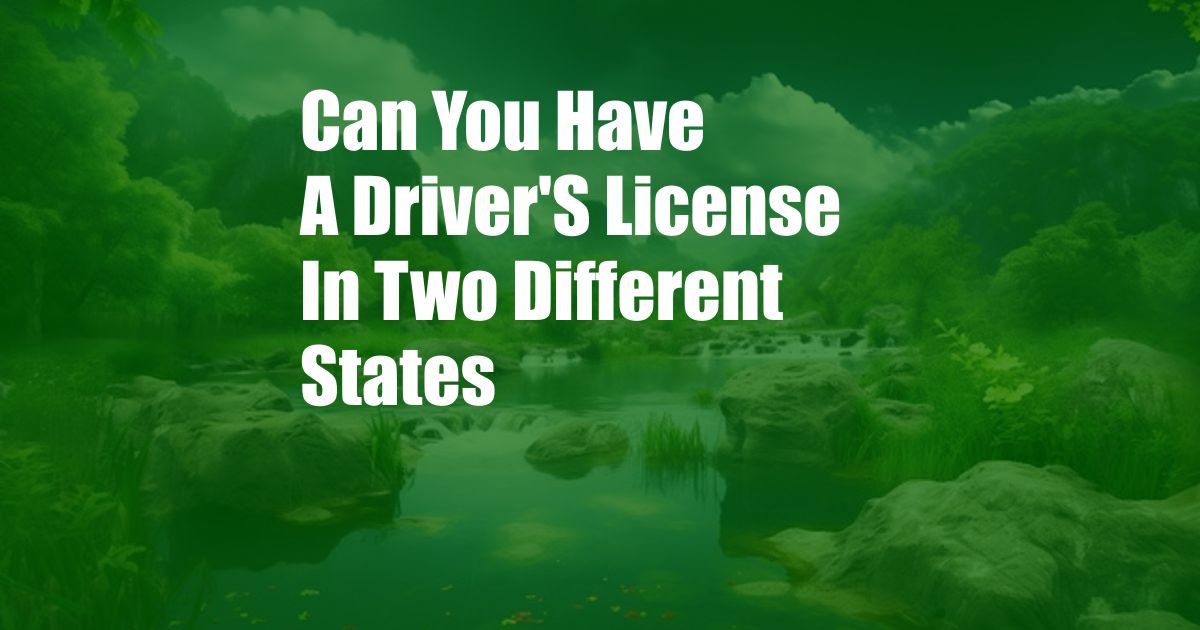
Can You Have a Driver’s License in Two Different States?
In a world where mobility is a necessity, the question of whether one can possess a driver’s license in two different states is a common one. Imagine yourself embarking on a cross-country journey or relocating to a new state for a fresh start. Understanding the complexities of driver’s license regulations becomes paramount in such scenarios.
To unravel the intricacies of this topic, let’s delve into the particulars that govern the realm of driver’s licenses and their validity across state lines.
Multiple Driver’s Licenses: A Legal Conundrum
The concept of holding multiple driver’s licenses in different states is generally frowned upon and deemed illegal in the eyes of the law. The United States Driver’s License Compact (US DLC), an agreement between 49 states (excluding Georgia), mandates that individuals can only possess a valid driver’s license in one state at any given time.
This stipulation aims to prevent license duplication, deter fraud, and maintain uniformity in driver’s license issuance and regulation. By adhering to the US DLC, states strive to ensure that drivers meet the licensing requirements of their primary state of residence and avoid the potential for conflicting regulations and penalties.
What it Means for You
In essence, you cannot legally hold driver’s licenses from two different states simultaneously. If you relocate to a new state, you must surrender your out-of-state license and apply for a license in your new state of residence within a specified timeframe, typically 30 to 90 days.
Failing to comply with these regulations can result in penalties such as license suspension, fines, or even criminal charges. It is crucial to be mindful of the laws governing driver’s licenses and make the necessary arrangements to maintain a valid license in your current state of residence.
Understanding Driver’s License Residency
Establishing residency in a state is a key factor in determining your eligibility to obtain a driver’s license. Residency is typically established through factors such as your physical address, voter registration, and utility bills. It is important to note that residency for driver’s license purposes may differ from residency for other legal matters, such as voting or paying taxes.
If you are unsure about your residency status, it is advisable to consult with the relevant authorities in your state. They can provide guidance on the specific criteria used to determine residency and assist you in understanding your obligations as a driver.
Tips for Maintaining a Valid Driver’s License
To ensure that you maintain a valid driver’s license and avoid any legal complications, follow these expert tips:
- Keep your address up to date: Notify the Department of Motor Vehicles (DMV) promptly if you move to a new address to ensure that your license and vehicle registration are updated accordingly.
- Renew your license on time: Stay alert to the expiration date of your driver’s license and initiate the renewal process well in advance to avoid driving with an expired license.
- Carry your license at all times: Make it a habit to carry your valid driver’s license whenever you operate a motor vehicle. This is a legal requirement, and it will facilitate interactions with law enforcement if necessary.
Additional Considerations
In certain exceptional circumstances, you may be eligible for a hardship license or professional driver’s license that allows you to operate a commercial vehicle in multiple states. However, these licenses are subject to specific eligibility criteria and may require additional documentation and fees.
If you have any questions or concerns regarding driver’s licenses, do not hesitate to reach out to the DMV in your state. They will provide you with personalized guidance and assist you in navigating the complexities of driver’s license regulations.
Frequently Asked Questions (FAQs)
- Can I get a driver’s license in two different states if I have a commercial driver’s license (CDL)?
In most cases, no. CDLs are typically issued by a single state, and holding multiple CDLs is generally not permitted.
- What happens if I get caught driving with a suspended license?
Driving with a suspended license is a serious offense that can result in fines, imprisonment, and other penalties, depending on the severity of the violation.
Conclusion: The Importance of Driver’s License Compliance
Understanding the regulations governing driver’s licenses is essential for responsible driving and maintaining good standing with the law. Remember, it is illegal to hold multiple driver’s licenses from different states. By adhering to the established rules and maintaining a valid driver’s license, you can ensure safe and legal driving experiences.